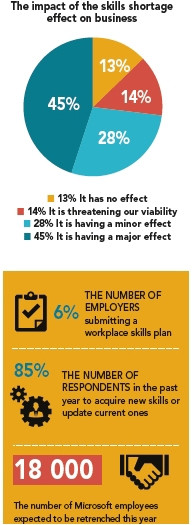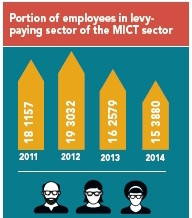
It's not clear how many skills we need in South Africa's IT industry. The figures from the 2014 JCSE ICT Skills Survey, which tried to make sense of it all, show we don't have a cooking clue.
The numbers from the IT industry in general are disparate. According to the report, the global technology market is expected to reach $4 trillion in 2015, yet Microsoft has recently reported that it's reducing its workforce by 20 percent. Which begs the question: where is this growth?
Another reason why the figures don't add up is MICT SETA's new model. Says Adrian Schofield, manager of the Johannesburg Centre for Software Engineering's (JCSE) Applied Research Unit: "The MICT SETA has used a new model to estimate the number of employees in the media, advertising, information and communication technologies sector." Previous reports have 200 000 employees in the sector, but this could now be as many as 665 000. The number of employers also appears to have been underestimated. These were previously reported as 4 500 and now it might be as many as 20 000. These figures cannot be scrutinised or verified, 'since the source is a draft report', says Schofield. He does, however, believe that these figures are more realistic.
Training methodology
While the industry is not entirely sure how to quantify the problem, it knows there is one. In ITWeb's inaugural CIO survey, which was released in October 2014, in association with Telkom Business, it was reported that agility and speed of execution, budget and lack of skills are the top operational concerns of local CIOs. This is echoed by the JCSE Skills Survey results, where 45 percent of the respondents confirmed that the skills shortage is having a major impact on business.
What the survey does reveal is that almost 25 percent of respondents value a graduate degree over a diploma, with vendor certificates rating the lowest. It also shows that knowledge-sharing with peers is still the most preferred training methodology, followed by e-Learning and podcasts. The least preferred is the use of external trainers or facilitators.
The survey also provides an indication of which skills the industry needs. Currently, organisations are focusing on enhancing security, improving competency in virtualisation, continuing migration to cloudbased applications and services, revamping network infrastructure and reviewing resources allocated to servers and storage.
According to the Orlando Gartner Symposium/ Expo 2014, the current peak skills are in mobile, user experience and data sciences. Three years from now, skills in smart machines, robotics, automated judgement and ethics will be required. The prediction is that in seven years' time, "top jobs in the digital environment will be integration specialists, digital business architects, regulatory analysts and risk professionals," says Schofield.
Exposure to ICT
However, the chances of South Africa's youth being able to fill these positions are slim if the basic education system isn't dramatically improved. "We have to achieve a paradigm shift to overcome the appalling fact that only about ten percent of the students who enter the basic education process in South Africa achieve a pass in maths or science subjects (even with the low 30-percent pass mark)," says Schofield.

"We continue to express our concern at the lack of improvement in this country's basic education system for the majority of pupils. Exposure to and familiarity with ICT is essential for all pupils in order for them to adapt these modern tools to their daily lives," he adds.
"Our problem is huge and shouldn't be underestimated," says the JCSE's Professor Barry Dwolatzky. "There are two-and a-half times more unemployed youths than adults in South Africa, and 60 percent in total on the continent. We're at risk of losing an entire generation if vital steps aren't taken."
This article was first published in Brainstorm magazine. Click here to read the complete article at the Brainstorm website.
Share